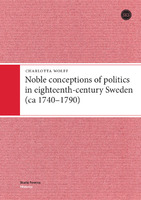Noble conceptions of politics in eighteenth-century Sweden (ca 1740–1790)
Abstract
"Noble conceptions of politics in eighteenth-century Sweden (ca 1740–1790) is a study of how the Swedish nobility articulated its political ideals, self-images and loyalties during the Age of Liberty and under the rule of Gustav III. This book takes a close look at the aristocracy’s understanding of a free constitution and at the nobility’s complex relationship with the monarchy. Central themes are the old notion of mixed government, classical republican conceptions of liberty and patriotism, as well as noble thoughts on the rights and duties of the citizen, including the right to rebellion against an unrighteous ruler. The study is a conceptual analysis of public and private political statements made by members of the nobility, such as Diet speeches and personal correspondence. The book contributes to the large body of research on estate-based identities and the transformation of political language in the second half of the eighteenth century by connecting Swedish political ideals and concepts to their European context."
Keywords
upper class; identity (mental qualities); political elite; ideals; systems of government; nobility; Age of Liberty; Autocracy; Finland; Gustav III of Sweden; Stockholm; SwedenDOI
10.21435/sfh.15ISBN
9789522227829;9789522227812OCN
1030816785Publisher
Finnish Literature Society / SKSPublication date and place
Helsinki, 2009Series
Studia Fennica Historica, 15Classification
History and Archaeology
c 1500 onwards to present day


 Download
Download Web Shop
Web Shop